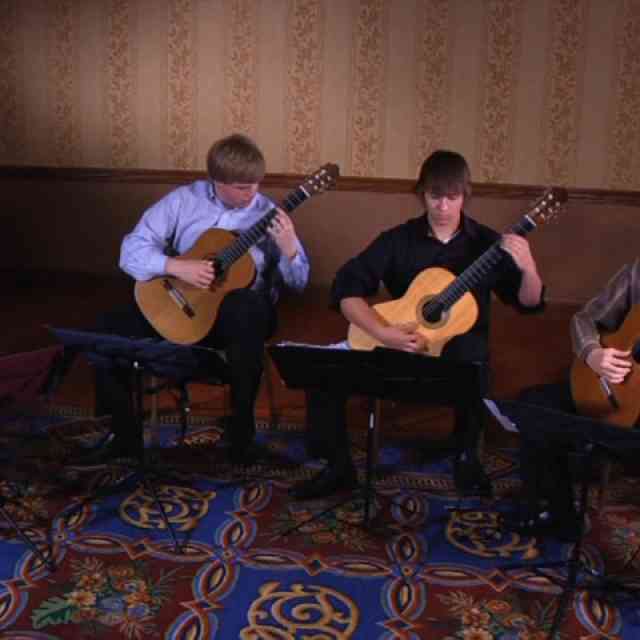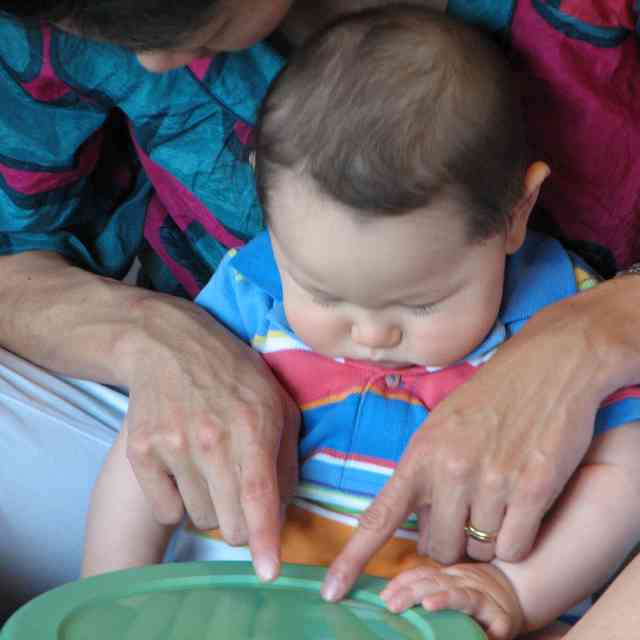Just about everyone seems to know about the Suzuki Method for Violin, but many people are not aware of Suzuki Guitar, although it’s been around more than twenty-five years. Two of the earliest Suzuki Guitar students were Connie Sheu and Adam Kossler – both of whom are excellent performers who have completed their Doctoral Studies in Guitar. Connie serves the GFA as Director of Communications and Touring and Adam has been multiple times a semi-finalist in the Concert Artist Competition. Recently, GFA has seen more Suzuki Students in the Ensemble Showcase and among recent winners in both Senior and Junior Divisions of the Youth Competition.
Due in part to the success of and visibility of our students, Suzuki Guitar is growing. There is also a growing need for qualified Suzuki teachers. This article will highlight unique aspects of teaching Suzuki Method guitar and how to pursue getting started building your Studio.
What makes Suzuki unique? What’s the difference between Suzuki Teaching and other methods of good guitar instruction? Teaching Suzuki Method is more about understanding Dr. Suzuki’s philosophy and approach to education than it is differences in the fundamentals of good guitar instruction. The statement “Every child can learn.” originated with Dr. Suzuki and now pervades the landscape of all types of education – not just music – at every level. At the core of his approach is the belief in the unlimited potential of the Student and that the Teacher along with the Parent assists the Student in the process of growing into a fine human being with a beautiful heart.
“Of all the work that people do, there is nothing more noble, nothing more important, than raising your own child to be a fine person.” (Shinichi Suzuki)
I have compiled a Checklist for a Successful Suzuki Guitar Studio. Certainly some of these items pertain to good teaching in general, but all of them have strong roots in the application of Suzuki Philosophy.
1 – Love playing your instrument and never stop working to improve your own skills. For me, the most important thing I have to pass on to my students is a love for music and a love for the guitar. It’s important to keep my own passion for playing stoked so that it is evident to my students.
“Until we die, we should spare no time or effort in changing our weaknesses to merits.” (Shinichi Suzuki)
2 – Enjoy working with parents and their kids in a partnering relationship.
Many Suzuki students begin their studies at very young ages. Working with the parents to monitor home assignments is a great way to accelerate success. Openness to learning about child development and willingness to stick with students through the ups and downs of their growing years is key in taking them to very advanced levels.
“Parents are the teacher’s assistant in teaching the child the violin and teachers are the parent’s assistant in developing the child character.” (Margery Aber; Suzuki Pedagogue)
3 – Get involved in the Classical Guitar Community.
You need like-minded people around to stay excited and to inspire your students. Your Students should be performing as much as possible! It is also vital to attend classical guitar concerts and workshops to assist in developing the vision of your students as advanced players. The GFA, Classical Guitar Societies and local Music Teacher Associations help provide support for the professional teacher/player as well as student activities to help grow your studio.
4 – Learn as much as you can about the Suzuki Method.
Observe an experienced Suzuki Guitar teacher in his/her own studio. Ask questions and take notes! Read about Suzuki’s life and plan to take Suzuki training courses.
There is a wonderfully informative video called “The Sound of Success” available at the following link: https://suzukiassociation.org/news/sound-success-suzuki-method-for-guitar-2/
Speaking of success, here are two of my favorite videos of Suzuki guitar students who have won the GFA Youth Competition.
Xavier Jara (Alan Johnston, Suzuki Teacher)
2011 Senior Division Winner
Yossi Kohrman-Glaser (Andrew LaFreniere, Suzuki Teacher) 2009 Junior Division Winne
“Education means to teach and develop. Without development there is nothing.” (Shinichi Suzuki)
5 – Suzuki Training Courses and Requirements
All prospective teachers must begin by taking the non-instrument specific, pre-requisite course “Every Child Can! (ECC)” an introduction to Suzuki Philosophy and Method. This course is 6-hours long and is suitable for teachers, parents and program administrators. After completion, you will need to join the SAA as an Active Teacher Member.
Prior to taking the instrument-specific Guitar Unit 1 Course, a teacher training video audition will need to be submitted at least 1 month prior to the start of the course. There are three options for video content:
For Units 1-4: L.Mozart Bourree and
R. Vidali La Folia Variations (in Suzuki Guitar Bk 4) For Units 1-7: both Bach Gavottes 1 & 2 (in Suzuki Guitar Bk 5)
and J. Guimares Sound of Bells (in Suzuki Guitar Bk 7)
For All Units (Comprehensive Audition): F. Sor, Op.9 – Variations on a Theme of Mozart
Unit 1 Training Courses are generally eight days long and take place in a variety of venues, including the Trainer’s home studio. A combination of classroom lecture and observation of student lessons comprise the course content. Upon completion of the classroom requirements, the Institute, workshop, or trainer sponsoring your course will officially register your training with the SAA.
“There is no born genius. Education is the way to develop ability.” (Shinichi Suzuki)
6 – Staying Power and Studio Growth
In my work conducting Suzuki Teacher Training Courses, I encounter a number of interesting attitudes among my trainees. There are those in the Classical Guitar community that view Suzuki as a kind of kindergarten-esque, guitar start-up idea. Many times I’ve heard comments like “I know how to teach and I’ve got a Masters. I’m only taking this course because the school I work at requires it and I’ll get paid more. Once I get the students out of Book 1, I’ll take over with what I know. I have my own ideas about how things should go.”
The Suzuki repertoire was formulated over 20 years by a Committee of guitarists most of whom have Masters Degrees and extensive teaching experience. They discussed every technique necessary to play guitar at the highest level and then sequenced those techniques allowing for peaks and valleys in the learning curve of the student. They considered that students would be starting at the age of 3 and progressing through a set of pieces concluding with the standard literature. The goal was to make it possible to have students “graduate” from all of the books in early adolescence, so Junior High students would be playing the standard college pieces moving on to Bach suites, concerti and more by the time they graduate from High School. If you consider the Student Winners I mentioned earlier, the Suzuki Rep has been successful in its mission. Our repertoire was finalized in 2009. As our students continue working with it and it becomes well established, then more and more students will play at higher levels sooner since they will have had older students as role models to emulate.
If you begin taking Suzuki training, give yourself, your students and the Method the best of your efforts for success—Make the commitment to stick with it by taking your students through all 9 books. THEN decide whether or not it’s effective. Only then will you experience the advantage of the years of research, the sensible sequence and technical application of the literature.
“Don’t hurry don’t rest. Without stopping, without haste, carefully taking one step at a time will surely get you there.” (Shinichi Suzuki)
7 – Students of all Ages (You cannot ‘outgrow the Method.’ )
Another attitude I often encounter is the myth that Suzuki Teachers do not teach advanced students.
On the contrary, Suzuki teachers not only possess great skills in bringing out the abilities of the youngest students, but are also inspiring with the older and advanced ones.
Because we begin with them so early, more of them are capable of performing difficult literature in an excellent way.
Many teachers have not only a Suzuki Guitar Studio, but also a successful collegiate program. Two examples are Joanne Castellani—Suzuki Teacher at the The Castellani- Andriaccio Guitar Studios and Professor at SUNY – Buffalo; and Joseph Pecoraro—the Suzuki Teacher at the Piedmont Suzuki Studios and Professor at Univ of N. Carolina School of the Arts.
“Begin early, go slowly and never stop.” (Shinichi Suzuki)
Closing Thoughts
Is there anyone who should NOT teach Suzuki guitar? If you’re mostly into your own playing and you see your students as a way to earn you more recognition to get better playing gigs – this job might not be for you. It is helpful to have the mindset to develop both careers side-by-side. Your playing will serve as a model and inspiration to your students, and they can begin their studies very young while you nurture them to the most advanced levels.
Maybe you expected this article to talk about physically setting up your teaching studio – but since Suzuki Method is not a franchise, there is not a lot of equipment or materials to buy. It is a philosophy of teaching, learning and living that many good teachers who are also good people find they already embody. You will likely find yourself looking for learning tools to assist in teaching the youngest kids and will probably end up employing some toys creatively toward that end. I could give you a list of games that Suzuki guitar teachers use – but with a little creativity, it is better to let you come up with your own list. It will be more fun that way!
Quotes taken from:
Suzuki, Shinichi; Ability Development From Age Zero; Summy-Birchard/Alfred Music–1981.
Suzuki, Shinichi; Nurtured By Love; Summy-Birchard/Alfred Music –1983.
(Except Margery Aber quote which is from the Manual for “Every Child Can!” published by the Suzuki Association of the Americas.)
Reprinted from GuitarEducation.org—the Online Education Magazine of the Guitar Foundation of America, with gratitude to Dr. Matthew Denman, GFA Director of Education.
For more about Suzuki Guitar, see Sound of Success, as well as The Suzuki Guitar Experience, an overview of the Suzuki philosophy and a history of the development of the Suzuki Method for classical guitar.
And don’t forget to check the Suzuki Guitar page, your one-stop place for Suzuki Guitar news and upcoming events.








